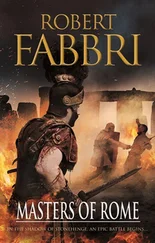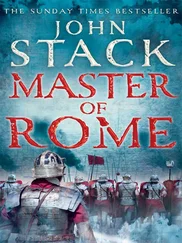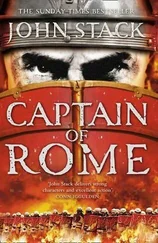The inspecting centurion looked past his men to the entrance of the courtyard, spotting Septimus and Atticus. He approached them with the confident, measured stride of a manipular centurion, a man totally at ease with his command and certain of his place in life.
‘Identify yourselves!’ he demanded of the two men.
‘Captain Perennis of the trireme Aquila , and Centurion Capito of the marines,’ Septimus announced, ‘reporting as ordered by the senior consul.’
The centurion grunted, his opinion of sailors and marines clearly written across his face. Septimus ignored the implied slur, although he marked the centurion’s face in his mind.
‘Fall into the front rank,’ the legionary commanded. ‘The consul is on his way.’
Atticus and Septimus walked forward and took their place in the formation of soldiers. The centurion took one last look at his assembled men before standing to the fore of the group, the signifer behind and to his left. All waited motionless for the consul to appear.
Scipio arrived five minutes later. He was followed by his guard commander and the twelve men of his personal guard, the praetoriani . Their distinctive black travelling cloaks billowed around them as they marched in step behind their master. The consul flicked his hand upwards and the guard commander called the soldiers to a halt, the hobnails of their sandals reverberating in the quiet of the afternoon air. Scipio walked on alone to inspect the demi-maniple of legionaries. He sensed and relished the stillness of the troops before him, their discipline and uniformity evoking memories of his own time in the legions, a simpler time when rules and orders dictated all his actions, just as they did for the men before him. He noticed the two commanders from the Aquila in the front rank of the formation, noticed that they were still in full battle armour. They kept and wore their armour well, although both showed signs of battles fought.
The sound of a horse’s snort caused Scipio to turn. A stable lad was leading a grey-white stallion across the courtyard to the assembled men. The horse was Andalusian, a Spanish horse, sixteen hands high. He had been warmed up and groomed and he scraped the flagstones with his right hoof, his body a mass of restrained energy. Scipio walked over to the horse and patted his crest and throat, talking gently to the stallion in the practised tone of a seasoned horseman.
‘A magnificent beast,’ he said to no one in particular before mounting.
The senior consul settled himself comfortably in the saddle and turned the horse around to face the demi-maniple. He noticed immediately that his mount was a warhorse, the animal responding to movements in Scipio’s legs and shifts in his body weight. In battle, the rider would be free to wield weapons in both hands, the horse not relying on the reins for guidance.
‘Form up!’ Scipio ordered the centurion, before wheeling the horse around.
‘Marching column!’ the centurion roared, and the demi-maniple transformed itself into twenty rows of three men abreast. Atticus and Septimus were in the front row, the naval captain thankful that he didn’t have to move for the column to form up, unfamiliar as he was with the finer points of legionary drill manoeuvres.
The consul’s guard led the march out through the double doors of the courtyard, followed by Scipio, who needed to duck beneath the overhead arch of the gateway. The demi-maniple of the Second followed, wheeling right as they left the courtyard to take the winding road down to the docks two miles away. The streets were empty before them, doors and shutters closed to hide the inhabitants within. The townspeople were used to seeing Roman soldiers in Brolium; however, the menacing sight of the black-cloaked guard of the praetoriani and the obvious importance of the Roman they escorted prompted the people to hide in trepidation.
The column wound its way out of the town of Brolium and set out on the road south to the encampment. The road was busy, with the constant flow of traders moving between the port town and the lucrative opportunities of the legions’ base camp. All stepped aside as the marching column of soldiers approached, many manhandling their carts from the ten-foot-wide dust road into the fields on either side. They stared in awe at the sight of Scipio riding gloriously in the evening sun, his bearing and perfect features heralding his wealth and stature, while the size of his escort announced his importance for all the world to see.
The Roman encampment was located a mile south of Brolium. The camp was the Second and Ninth legions’ castra hiberna , their winter camp, and was a semi-permanent structure suitable for the soldiers’ extended stay in the cold months. Even now the weather heralded the arrival of spring, when Ceres’s vibrant touch would transform nature in celebration of Proserpina’s return to the world from her winter exile in Hades. The arrival of spring would also herald the beginning of the legions’ campaign season, and soon the Romans would march away from Brolium to carry the fight to the Carthaginians holding the western half of Sicily. If they were successful they would not return and a new castra hiberna would be constructed deep in what was now enemy territory.
As the column approached the encampment, they passed the advanced stations of the legions. These guard posts were located two hundred yards from the camp on each approach road and were manned by four legionaries. Septimus could see that they had been forewarned of the consul’s possible arrival, as all four soldiers stood to attention outside the guard hut where normally one would stand while the other three rested inside. They did not challenge the column but let it pass in silence, their eyes looking straight ahead, not daring to look up at Scipio for fear of drawing his attention.
The main camp was rectangular in shape, built of two squares, one for each legion, and the long axis of the camp ran parallel to the road. The whole area was surrounded by a deep trench, fifteen feet across and five deep with the excavated earth thrown inward to form a formidable rampart, on top of which stood the wall. Near the main gate, the Porta Praetoria, the wall had been reinforced with stone; however, the majority of the palisade was constructed from wooden stakes cut from young oak trees. The branches of the stakes had been sharpened and interwoven with each other to form a near-impenetrable obstacle, and at each corner of the rectangle a twenty-foot-high watchtower stood, giving the sentries advance warning of any approaching force on the uninterrupted surface of the valley floor.
The column passed through the open gates of the camp, again without challenge or check, to be confronted, immediately inside the walls, by the massed ranks of the Second and Ninth legions. They had been drawn up in manipular formation; a legion stood on each side of the road running directly down the centre of the camp to the officers’ quarters in the centre. As Scipio rode under the archway of the gate, the legionaries roared with one voice:
‘Rome Victorious!’
Scipio rode on at the measured pace of the march, never looking left or right. A man born to command, the blood rushed in his veins at the sound of twenty thousand shouting in his honour. His expression was imperial, a look of fraternal pride, as if each man before him was a younger brother, a brother of Rome. Drawn up across the road before him were the senior officers of the legions. The commander of the praetoriani called a halt to the column and Scipio dismounted, covering the last few steps of the journey on foot.
‘Greetings, Senior Consul,’ a tall authoritative man at the head of the officers declared. ‘Welcome to Sicily.’ He was Lucius Postumius Megellus, legate of the Roman legions and a member of the Senate.
Читать дальше












